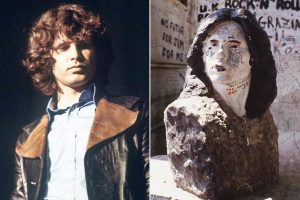World News
The Lost Statue of Jim Morrison: Found After 37 Years
The Enigmatic Legacy of Jim Morrison
Jim Morrison, the iconic lead singer of The Doors, remains one of rock music’s most enigmatic and influential figures. Known for his poetic lyrics, charismatic stage presence, and rebellious spirit, Morrison shaped the sound and culture of the 1960s counterculture. His untimely death in 1971 at age 27 cemented his status as a legendary figure in music history.
Morrison’s grave, located in Père Lachaise Cemetery in Paris, has become a pilgrimage site for fans worldwide. It’s a place where admirers honor his artistic contributions and enduring mystique. The statue originally placed at his grave symbolized Morrison’s lasting influence and the deep connection fans feel with him decades after his passing.

The Theft of the Statue: A Mystery Begins
In 1986, a bronze statue of Jim Morrison was stolen from his grave, sparking shock and sorrow among fans and caretakers. The theft was more than just a crime; it felt like an assault on Morrison’s memory and the sanctity of the grave site.
For years, the whereabouts of the statue remained unknown, becoming a legend of sorts within fan circles and the broader music community. The disappearance underscored the challenges in protecting the graves of famous figures, especially those who inspire passionate followings.
The statue’s theft also highlighted the complex relationship between fame, memory, and fan devotion—how memorabilia and symbols associated with idols become coveted and vulnerable.
The Statue’s Rediscovery: A Long-Lost Artifact Returns
In a surprising turn of events, the statue was recently found 37 years after its disappearance. The rediscovery has reignited interest in Morrison’s legacy and the cultural significance of the statue itself.
Details surrounding the statue’s recovery remain sparse, but the news has been met with excitement and relief. Fans view the return as a restoration of a piece of rock history and a symbol of reverence finally being restored.
The statue’s journey over nearly four decades remains a subject of intrigue, inviting speculation about where it had been and who may have held it during that time.

The Cultural Significance of Memorials in Rock History
Memorials like Morrison’s statue play an important role in how fans and society at large remember and honor cultural icons. They serve as tangible connections to artists whose influence transcends generations.
In rock history, statues, plaques, and gravesites are often pilgrimage destinations, places where fans gather to pay tribute and feel connected to the spirit of the music and its creators.
The theft and subsequent recovery of Morrison’s statue emphasize the importance of these physical memorials in preserving cultural memory and the ongoing dialogue between fans and the legacies they cherish.
Moving Forward: Preserving Jim Morrison’s Memory
The return of the statue presents opportunities to reflect on how best to preserve Jim Morrison’s memory for future generations. It calls attention to the need for security and respect around such memorials to prevent similar incidents.
Fans, historians, and caretakers are likely to discuss new measures to protect the grave site and associated memorabilia. The rediscovery also provides a moment to celebrate Morrison’s enduring impact on music, poetry, and popular culture.
As the statue is restored to its rightful place, it will continue to inspire visitors, reminding them of Morrison’s rebellious spirit and artistic genius.
From newvisiondesignus


